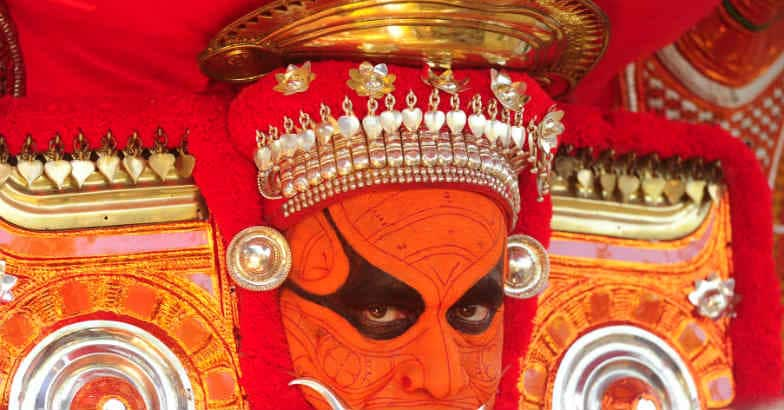Malabar Theyyams, a mix of color and piety

Mail This Article
The Malayalam month Kanni is over and the land is stepping into Thulam with its touch of cold and mist.
Come Thulam and Kolathunadu is abuzz with Theyyams. Malabar, steeped in rituals and folklore, is home to Theyyam or Kaliyattam. Time stands still. The air is heavy with devotion and piety and the land rings with the cheer of shared joy and camaraderie. No one is defined by caste, class or religion. It’s a seamless integration of centuries-old traditions by people of all faiths. So rich are theyyams in their celebration of the Divine.
The air is full with the sound of big drums as theyyams dance to their rhythmic booms. Temples, sacred groves and all possible places are replete with ornately decorated Theyyams celebrating life and helping everyone to bond. Land and life becomes one big splash of color.
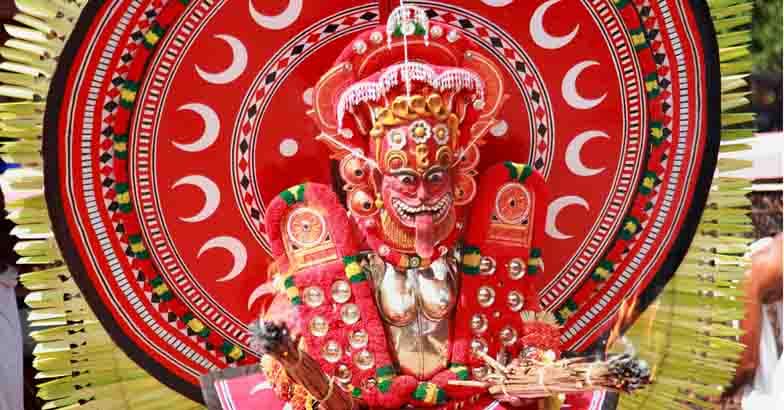
On the 10th day of Thulam, countless Theyyams array themselves in gay abandon and dance to the beats of the chendas. They are the gods, beneficent and forgiving. People flock to them with their tales of woe and suffering. Blessings are sought from the Theyyams, the gods who give them everything in abundance. Hands outstretched, they bless everybody with a smear of red or turmeric: May all of you be blessed, they say and do their traditional dance. The devotees return, happy in the simple belief that they’ve been truly blessed. Though Theyyam deities like Mother goddesses (amma deivangal), manthra moorthies and Veeranmar are aplenty, it’s the amma deivangal who are more popular and loved.
Here’s a trip into the heartland of Theyyams and their tales, right from Arayi Chamundi who takes her boat across the lake to her master to whom she narrates the tales of the peasants who work the fields, to Vishnumurthy of Mavilakkadappuram, and then to Valiyavalappil Chamundi of Thimira who comes to the fields to sow seeds on the first day of thulam, and finally to the “ottakolam”, or Vishnumurthy, who transforms himself into the children’s Theyyam of Achamthuruthi Island.
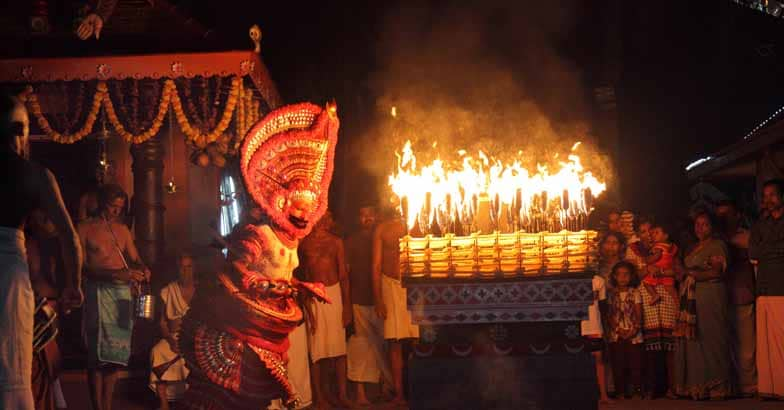
These are some of the rare theyyams of North Malabar. Welcome to the land of lores, the Theyyam-thira!
The Vishnumurthy who surges into the sea
The Vishnumurthy temple of Oriyarakavu rests on the Valiyaparambu island, surrounded by the roaring sea all around. The sight of an excited Vishnumurthy charging into the sea on the final day of the temple festival, soon after balitharpan, is one fraught with faith, devotion and piety. Rich in tradition and centuries-old beliefs, it’s an act of total devotion.
Folklore has it that King Arya’s daughter who came on a visit to Malanadu on a wooden ship with a hundred handmaidens in tow, later settled down in the place and ultimately became a goddess. Custom says Vishnumurthy enacts the annual ritual of rushing into the sea to greet the princess and her royal entourage. An elated Vishnumurthy is prevented from rushing into the roaring waters by the swarm of devotees who join hands and hold him back. The Mavilakkadappuram temple festival is held in the first week of November.

Theyyams who row across Arayipuzha
Though Theyyams are familiar on temple grounds, one has to head for the village Arayi near Kanhangad to have a look at the ones which cross the waters to go across to their thampuran. The Arayi Chamundi theyyam crosses the river in a small boat and reaches the banks opposite to visit her thampuran. Once there, it’s a ritualistic narration by Arayi Chamundi of all that took place in the fields down the river. Accompanying her in all vigour is the Kalichan theyyam.
Vayalil Chamundi
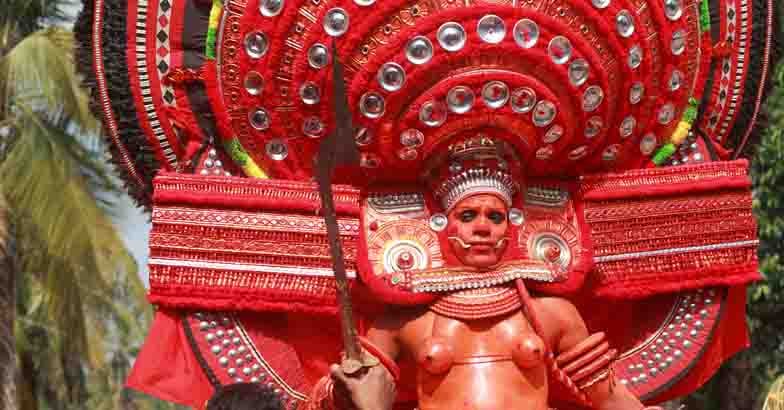
On the 1st of Thulam, Valiya Valappil Chamundi steps out to the fields of Thimiri village to sow seeds. This marks the beginning of the second crop. The Theyyam comes to the paddy fields to the accompaniment of cheers and the beat of drums. He then sows the seeds and starts dancing. A headgear with tender palm leaves, a white face mask, and a red dress complete Chamundi’s ensemble. After sowing the seeds, Chamundi heads for the Thazhakkattu Mana, after which he makes a round of all the houses in Thimiri village and accepts all the offerings. By noon Kalichan theyyam also steps into the arena. Together, they step out to bless all devotees who line up in awe and reverence to be blessed by their gods.
Theyyams for children
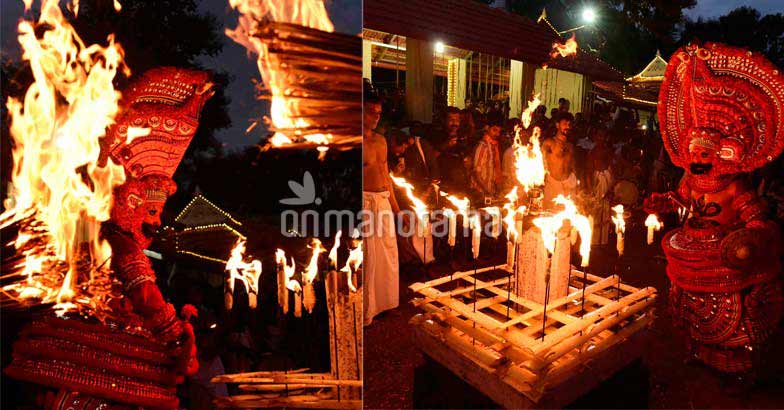
The children’s “ottakolam” in Achamthuruthi island is usually observed during Shivrathri. According to folklore, children used to keep themselves awake by acting as Theyyams, which became a proper custom later on. When the custom was first founded, children would stay awake by dressing up as Theyyams, make bonfires out of coconut shells and dance over the embers. As the practice caught on, the elders of the village found it distasteful and had it banned. When the village elders asked the children to stop their barbaric ritual, they stopped dressing up as Theyyams as well. Things were more or less forgotten till the village found itself in the grip of smallpox and other contagious diseases. The elders then huddled together for a “prashnam” and it was then that the game played by the kids spilled out in the open.
When the prashnam proved that the gods were happy with the kid theyyams, it was decided to build a Balagokulam there. Vishnumurthy and Chamundi are the revered Theyyams here. All the rituals and programmes in the temple here are carried out under the leadership of children.
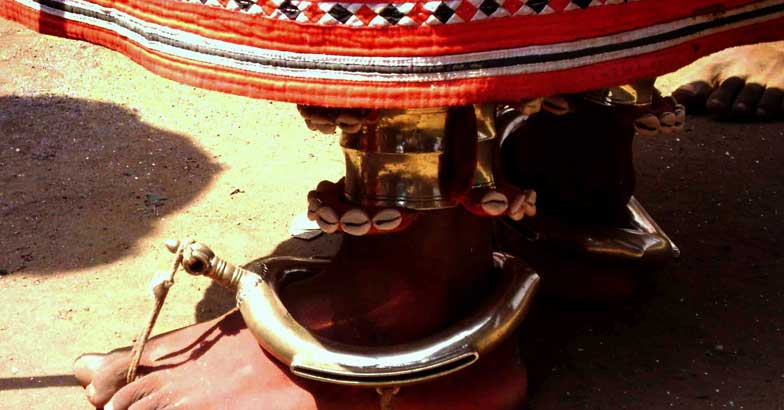
Children make up the temple committee and they fast and offer prayers for Vishnumurthy.
Mappila Theyyams
There are traditions, customs and rituals galore in Malabar which forge strong bonds of love and friendship between religions. Vishnumurthy and his entourage dancing their way to the mosque along with Muslim Theyyams are a rare show of communal amity. It’s the Muslim community here which takes the responsibility of organizing the “Kaliyttam” at the Vishnumurthy temple in Chemeni Nidumba. The community also manages the functioning of the temple.
The amma deivam
Kayyoor, the bastion of the reds is the synonym of rebellion and martyrdom. Kandathillamma (Cheralath Bhagavathy) is the main deity here. Patron goddess of fertility, she is offered gold and salt and in return blesses devotees with offspring.
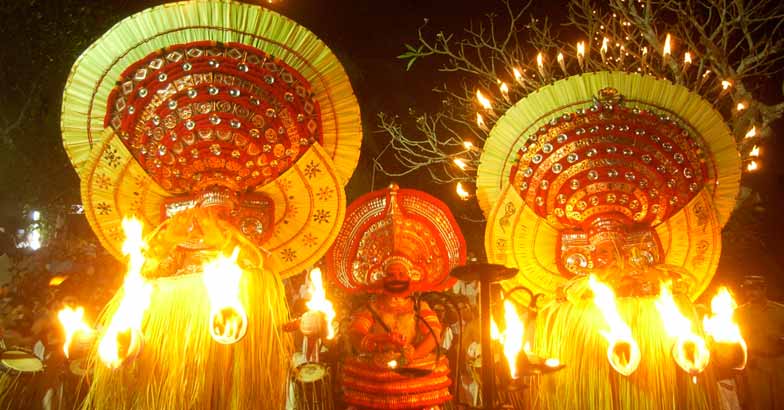
Come Theyyam season, thousands throng the place to witness Theyyams dancing and seeking her blessings. The Kaliyattam here takes place during the second week of November.
Pelikode Perumkaliyattom
The first Perumkaliyattom of the season will take place at the Vengakode Bhagavathy temple after a long gap of 21 years, from January 12 to 17. More than 20 Theyyams will gear up to perform every day. About a 100 Theyyams will do their ritual dance on the temple premises during Perumkaliyattom.
Theyyams have an enduring allure in Malabar, especially in its northern parts. There’s magic, there’s devotion and the presence of God everywhere.
